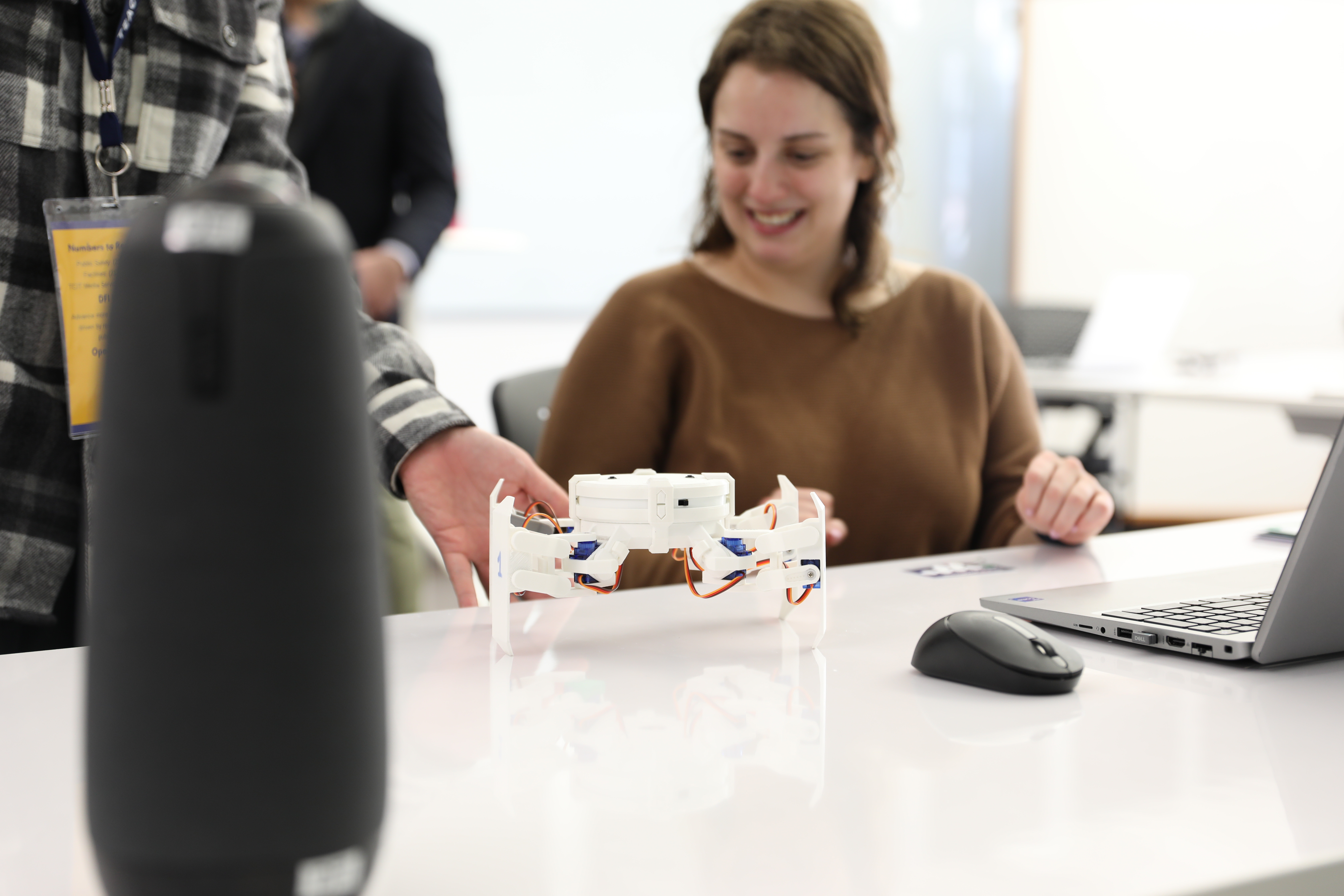The Teachers College Digital Futures Institute is launching a robust research and development agenda to study the latest advancements in technologies and assess their impacts across diverse educational contexts.

What we do
We build upon the rich digital research landscape at Teachers College with projects spread out across departments, centers, and labs, where our colleagues are leading research efforts in immersive digital learning, extended reality, media and civic engagement, artificial intelligence and robotics, maker education, digital literacies, and much more.
These projects pose timeless, as well as timely questions about different aspects of learning, teaching, wellness, community, childhood, and many other topics vital to the study of education, health, and psychology.
Publications
Working Papers
Browse papers featuring multi-genre commentaries on topics related to digital futures.
Recent Publications
Browse recent publications authored by DFI-affiliated researchers
Affiliated Labs & Centers

Open Practices
Open Practices is a hub for collective study and experimental educational forms. Housed at the Digital Futures Institute, at Teachers College, it is open to faculty, students, practitioners, and anomalies, anywhere. It is loosely organized around the common form of the reading group (although “practice group” might also work). Current and proposed groups include: Puppets, Gestures, Diagrams, Aphorisms, Improvisational Reading, and Somatics.
DFI Speaker Series
An archive is not just a repository of the past, but evokes potential futures. Diversity in the modes of media archived leads to a richer, more complex catalog. Join us for a critical dialogue on the junction of archiving and multimodal scholarship. This panel will discuss the role of both conventional and unexpected archives in academic research, and fosters a conversation on the future of archiving in the post-digital era.
Past Speakers
Event description:
When I was in 7th grade, I had a profound experience in the classroom when studying the Holocaust. Teachers collaborated to simulate the experience of having only certain students rounded up by other selected students, placed into confinement, and forced to do work. As one of the students who was targeted, I experienced a transformative epiphany for the first time in my life, and a profound sense of empathy followed. In this talk, I will discuss several classroom case studies that help students to discover the kind of experiential learning and agency that can lead to great breakthroughs in insight and learning. We will then look at the framework for creating these types of experiences successfully for classroom implementation.
Caroline Murphy, or Caro, is a game and interactive experience designer. Currently a Visiting Associate Professor at Northeastern University, Caro's career includes a notable tenure as Immersive Experience Director for Disney's Star Wars: Galactic Starcruiser. They co-lead the Playable Theatre nonprofit, promoting interdisciplinary creators in interactive live performance art. Caro serves as Executive Creative Director of Incantrix Productions, crafting independent interactive experiences globally and collaborating with writers and designers worldwide. With a rich background in education, they have taught everywhere from leading institutions such as Harvard and MIT to small nonprofits arts organizations targeting children in underserved communities. They are also proud of their ten-year leadership of BostonFIG, fostering the next generation of game creators and producing the world's largest independent games festival.
Event description:
In We See Through a Glass Darkly: Art, Technology, and the Unknown, artist and educator Allyson Packer explores the relationship between mystery and human progress. Interrogating the myth that technological advancement makes our world more decipherable, she leads an overview of her video and installation projects that address topics from our bewildering embodied relationship to virtual space to speculation about the role of the human brain in a mixed-consciousness culture. Plumbing the generative potential of these emerging unknowns, she proposes the enduring importance of mystery in creative thinking and the value of not fully understanding the world around us.
Event description:
Sundström Sjödin's presentation centers on a study on the socio technical imaginaries and educational cares and rationales for reading books when a robot– Bibi – becomes a node within the traditional Swedish welfare system. Here, public libraries, tech corporations, schools, children, and books meet in an endeavor to encourage and develop children’s reading. Drawing on concepts from science- and technology studies (STS), our study shows how reading (with a robot) is enacted as a care practice, where caring for the children’s reading and literature is displaced by care for the robot, in care practices that uphold the enchantment of the robot. Caring for the robot has unexpected and unintended effects such as failures, disruptions, exclusions and even violence, which chafe with the aim of the Bibi- project. Because, although the robot is designed as a care robot that is imagined to helping children who struggle with reading, this is in fact the task that the robot might be least equipped to do.
Sundström Sjödin is an assistant professor in Swedish at the School of Education, Culture and Communication at Mälardalen University in Sweden. Her main research interests focus on literary didactics, critical literacy and science- and technology studies, and especially the processes in which reading and literature becomes valued/valuated as beneficial for individuals as well as for society.
Event description:
In 2021, Oyate Group launched the Bronx Rising Initiative to reverse the effects of the pandemic on The Bronx. It began with the first ever COVID-19 vaccination effort for New Yorkers living in public housing in The Bronx. Oyate Group’s efforts then expanded to focus on communities targeted with misinformation and those that were under-vaccinated due to access issues and vaccine hesitancy. Hear from Jason Autar, Oyate Group’s COO on how data collection and mapping led to the organization vaccinating over 40,000 New Yorkers deemed “unreachable” in under one year.
Event description:
In this seminar, Dr. Ruth Cobos will share her research experience involving various Learning Analytics approaches developed by her and her team colleagues within the context of MOOCs at the Autonomous University of Madrid or Universidad Autónoma de Madrid (UAM, Spain). Initially, she will introduce edX-LIMS (System for Learning Intervention and Monitoring in edX MOOCs) and its application over more than 3 years within an edX MOOC. edX-LIMS stands as a Learning Analytics system that incorporates an intervention mechanism, analyzing learners' performance within the course and delivering feedback through a web-based Learner Dashboard. Additionally, the system provides MOOC instructors with a web-based Instructor Dashboard, facilitating the monitoring of learners' progress and offering assistance accordingly. Next, she will introduce M2LADS (Multimodal Learning Analytics Dashboard System) and its application involving data collected from MOOC learners. Within UAM, she and her team have monitored the engagement of more than one hundred learners participating in a MOOC learning session, with M2LADS being the platform for data management. During these sessions, they have gathered multimodal data from biometric and behavioral signals, encompassing metrics like electroencephalogram data for cognitive attention assessment, heart rate for emotional evaluation, and visual attention derived from video recordings. M2LADS offers a means to capture a comprehensive understanding of learners' experiences throughout their interactions with the MOOC. This amassed data holds the potential to enhance learning outcomes through feedback visualizations and interventions, in addition to refining learning analytics models and improving the content of the MOOC.
Ruth Cobos is Associate Professor in the Department of Computer Science at Universidad Autónoma de Madrid (UAM, Spain, https://www.uam.es/). She received her M.Sc. and Ph.D. degrees in Computer Engineering from UAM. She has been member of the research group GHIA (Grupo de Herramientas Interactivas Avanzadas, https://vghia.ii.uam.es/) at UAM since 1999 and member of the research group CONTIC (Grupo de Excelencia Cognición y Contexto: el aprendizaje colaborativo mediado por ordenador) at Universitat de Lleida (UdL) since 2005. She is the Principal Investigator from UAM of the eMadrid Research Network (http://www.emadridnet.org/) and of the Spanish Network of Learning Analytics – SNOLA (https://snola.es/). She has participated in more than fifteen R&D projects. During 2008 and 2009 she was de Principal Investigator of a project funded by the Agencia Española de Cooperación Internacional para el Desarrollo (AECID), which involves researchers from UAM, from UdL and from two universities at Colombia. As Rector’s Delegate for Educational Technologies (2014-2016) she directed the technical office at UAM for the generation and creation of UAM MOOCs at edX. UAM has been member of edX consortium since 2014 (https://www.edx.org/es/school/uamx). Nowadays, she is the coordinator of the MOOC instructor team of the course entitled “Introducción al desarrollo de aplicaciones web” (https://www.edx.org/es/course/introduccion-al-desarrollo-de-aplicaciones-web-2). She received the Meritorious Service Award 2022 (e-Madrid Excellence Network) for outstanding contribution to the development conference of EDUCON - IEEE Global Engineering Education. Currently, her main research areas are e-Learning, Blended Learning, MOOCs, SPOCs, Learning Analytics, Multimodal Learning Analytics, Educational Technologies, Artificial Intelligence in Education, Machine Learning, Sentiment Analysis and Natural Language Processing. More information at: https://vghia.ii.uam.es/member?filepath=cobos_ruth.txt
Event description:
The intensive commodification of human attention represents a major new economic, social, and technological development. While our screen-based lives present powerful opportunities for community formation, novel modes of access to information, and unprecedented means by which to achieve emancipatory change, it is also the case that platform capitalism increasingly fracks our minds and eyes for the vaporous money-value of our most precious human faculty — our capacity to attend. In this lecture and discussion, D. Graham Burnett will discuss the history of the “attention economy,” and sketch its implications for teaching and learning in the twenty-first century. In what way can collective forms of “Attention Activism” push back against pernicious forms of financialized exploitation of our time, thought, and sensory lives? How can the equitable defense of our attentional capacities and resources be framed as a core matter of epistemic justice?
Event description:
Studio[A], a collaboration between Culture Touch and the Acosta Institute, is a creative hub where storytelling, design, and education intersect. Our mission is to harness the power of creativity, technology, and contemplative practices to inspire transformation, foster social change, and empower individuals and communities. Through immersive experiences, innovative design solutions, and educational programs, we strive to cultivate a space that nurtures curiosity, amplifies diverse voices, and promotes healing-centered approaches to education. We are committed to bridging the gap between art, technology, design, education and entrepreneurship in order to harness the potential of storytelling to ignite dialogue, challenge perspectives, and create a more inclusive and equitable society.
Event description:
Artificial Intelligence (AI) is changing what it means to be human. In an era where algorithms monitor and shape our desires and decisions, a new consciousness needs to arise. Join scholars, innovators, artists, and healers in an imaginative journey to explore our collective perspectives in response to AI. Drawing on tech expertise as well as neuroscience, anthropology, art, and music, we aim to create space for a more expansive and life-centered conversation.
Become Affiliated
If you are a TC faculty member and interested in working more closely with DFI to share and learn, please email DFI.